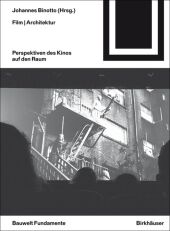 Neuerscheinungen 2017Stand: 2020-02-01 |
Schnellsuche
ISBN/Stichwort/Autor
|
Herderstraße 10
10625 Berlin
Tel.: 030 315 714 16
Fax 030 315 714 14
info@buchspektrum.de |

Johannes Binotto
Film Architektur
Perspektiven des Kinos auf den Raum
Herausgegeben von Binotto, Johannes
2017. 192 S. 60 b/w ill. 190.00 mm
Verlag/Jahr: BIRKHÄUSER BERLIN 2017
ISBN: 3-03-561437-7 (3035614377)
Neue ISBN: 978-3-03-561437-4 (9783035614374)
Preis und Lieferzeit: Bitte klicken
"Ich bin das Kino-Auge. Ich bin ein Baumeister", schrieb der Filmregisseur Dziga Vertov. Wo gefilmt wird, fängt die Kamera unweigerlich jene Räume ein, die sich vor ihrer Linse befinden. Doch begnügt sich das Kino nicht damit, existierende Bauwerke abzubilden; mit seinen Methoden der Bewegung, der Kadrage und der Montage durchkreuzt, manipuliert und konstruiert es Architekturen. Architektur ist somit für den Film nicht bloß Sujet, der Film ist vielmehr, wie Eric Rohmer schreibt, selbst schon "eine Kunst der Raumorganisation". So spiegelt der Film einerseits die Tätigkeit von Architekturschaffenden und macht andererseits das Kino zu deren Lern- und Experimentierfeld. 13 Originalbeiträge entfalten Aspekte der so inspirierenden wie komplexen Beziehung zwischen Architektur und Film.
2016 New editorship
Elisabeth Blum, Jesko Fezer, Günther Fischer, Angelika Schnell
Not unjustly referred to as legendary, this series of books on the history and theory of architecture and urban development was founded in 1963 by Ulrich Conrads, who was joined by Peter Neitzke as a co-editor of the series in the early 1980s. Now numbering over 150 titles, it is the most comprehensive German-language book series covering these fields. Following the deaths of the two longtime editors Ulrich Conrads (2013) and Peter Neitzke (2015), a new editorial committee was formed to continue their work: Elisabeth Blum, Jesko Fezer, Günther Fischer and Angelika Schnell. As the future editors of this series, it is our aim to maintain the course set by our forerunners.
The series has fulfilled its original aim of taking stock of the constructional and urban planning ideas and realizations formulated and achieved over the twentieth century in exemplary fashion. The Bauwelt Fundament series actually represents a history of ideas in the fields of planning and building that extends from the beginning of the twentieth century into the present.
The second objective of the series, one that is anchored in its very name, will also continue to guide the development of the series, namely the publication of foundational thought - authoritative and fundamental - rather than passing opinion, of theses and polemics relating to the burning architectural and urban planning themes of the time. Penetrating complex interrelationships and probing them with systematic analysis provides the prerequisite for fruitful discourse and ongoing debate.
As a forum for such discourses and contributions, the Bauwelt Fundamente series is maintaining its focus on the areas of architecture and urbanism, supplementing it with the always necessary historicalinvestigation of important questions and texts and its extension into other cultural and social fields.
A strong international orientation and the desire for more female authors are self-evident in such a context.
The original graphic design approach taken by Helmut Lortz to the series is being maintained. As is fitting for a working library , Bauwelt Fundamente titles remain simply designed, using black and white for the logo, the images on the front and back, and the eleven-line summary of the volume´s contents. This is indicative of the broad orientation of Bauwelt Fundamente to all those interested in the cultural and social development that provides the context for the creation of cities, houses and other objects, which in turn create contexts for the world. "Architects, it is said - or hoped - have always been interested in the world beyond the boundaries of their profession." (1)
(1) Peter Neitzke, manuscript of his address Nicht mit dem Rücken zur Gesellschaft (Not with one´s back to society) given to mark the fiftieth anniversary of Bauwelt Fundamente in Berlin, 2013.
Johannes Binotto, Kultur- und Medienwissenschaftler, Dozent für Filmtheorie an der Hochschule Luzern


